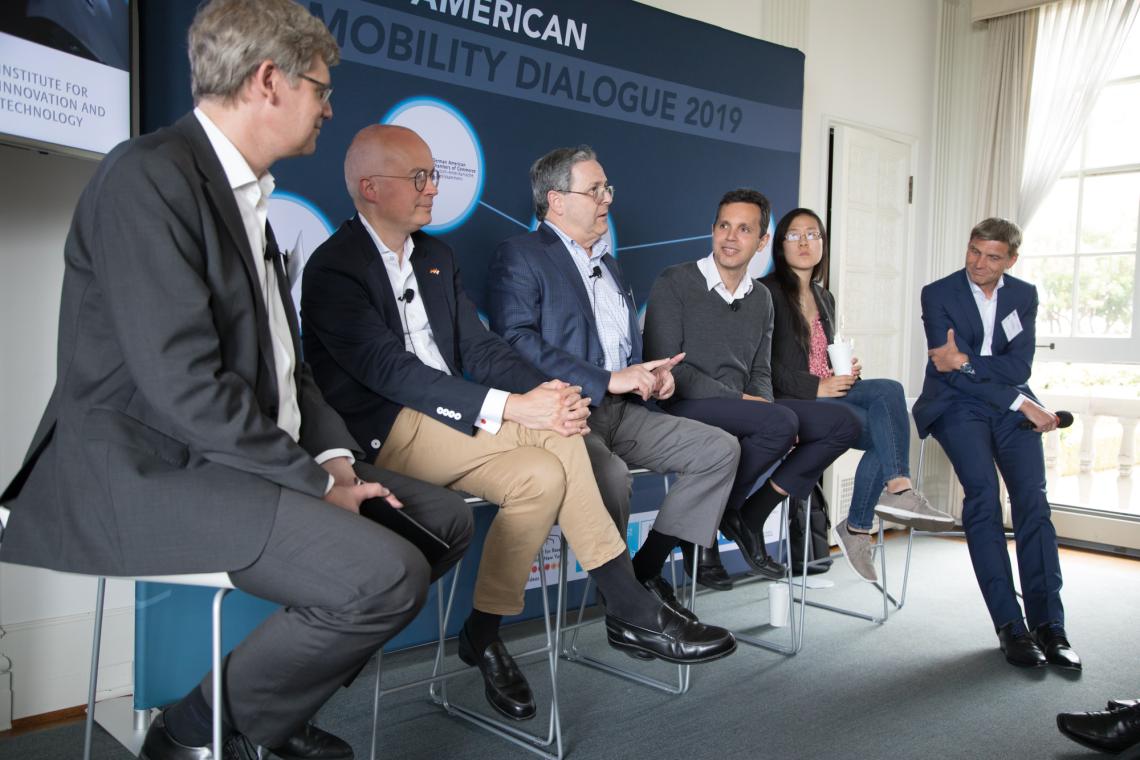
Diskussionsrunde zum Abschluss des Deutsch-Amerikanischen Mobilitätdialogs: (von links) Gereon Meyer (VDI/VDE-IT), Michael Bültmann (HERE Deutschland), Steven Shladover (University of California Berkeley), João Barros (Veniam), Emily Shao (Zoox) und Sven Beiker (Stanford University).
The idea that automated vehicles could one day be responsible for the transportation of people and goods and the provision of services in a city completely autonomously is both promising and unsettling, and therefore requires careful and comprehensive planning of the necessary innovation process. This is the very essence of the German-American Mobility Dialogue, which took place on 9 July 2019, entitled ‘Automated Transportation – Changing Cities, Society and Business’ at the German Consulate General in San Francisco, CA (USA).
Representatives from business, politics and research discuss new concepts
The full-day event, which grew out of two successful panel discussion nights in previous years, was attended by more than 120 participants from both sides of the Atlantic; the audience included, in particular, the research and development centres for the German automotive and supply industry in Silicon Valley. The event was organised by the German Chamber of Commerce Abroad in San Francisco (GACC West), the consultancy Silicon Valley Mobility and the Institute for Innovation and Technology (iit), part of VDI/VDE Innovation + Technik. It was moderated by Dr. Sven Beiker, lecturer at Stanford University, and Dr. Gereon Meyer, deputy head of the Future Mobility and Europe department at VDI/VDE-IT.
The event was kicked off with a morning fireside chat between Rodney Slater, former U.S. Secretary of Transportation, Dr. Thomas Becker, Vice President of Governmental and External Affairs at BMW and Dr. Giovanni Circella, director of the ‘3 Revolutions’ program at the University of California Davis. The focus was on how the trends of electrification, automation and shared mobility are interacting to fundamentally change the world of automobiles and road traffic.
Challenges of automated city traffic
In the spirit of a participatory dialogue, the audience then split into working groups, each session discussing one of four different aspects of automated urban traffic under the guidance of a leading expert:
- Human-Centric Urban Mobility (hosted by: Prof. Constantinos Antoniou, TU München),
- Intelligent Mobility Robots (hosted by: Hiren Desai, Continental),
- Shared Mobility Business Models (hosted by: Prof. William Riggs, University of San Francisco) und
- Clouds & Networks (hosted by: Ashley Tarver, Cloudera).
Then, the leaders of the working groups together drew up a multifaceted, big picture of the future of mobility in a dialogue session. Although a self-driving shuttle that, for example, takes robot parcel delivery “dogs” to where they need to be may seem worthwhile from a technical point of view, this poses challenges in terms of digitalised traffic management. And from the user’s point of view, questions regarding road safety, the impact on the environment and appropriate allocation of public space arise. Participants therefore agreed that, in order to implement the vision for city robotics, careful planning, that takes into account technical and non-technical factors at an early stage, is needed.
International collaboration
The closing panel discussion was dedicated to the question of how the various sectors and disciplines involved in Germany and in Silicon Valley could work together to speed up innovation around automated mobility. Alongside the need to strengthen the sharing of information and networking across the Atlantic, the value-added processes pursued in this area particularly by the IT industry need to be made available to many players and, when research and development is funded, better account needs to be taken of global innovation processes with international approaches.
Just published: Volume 6 of the ‘Road Vehicle Automation’ book series
At the end of the event, the two hosts presented the sixth volume of the ‘Road Vehicle Automation’ book series published by Springer as part of the Lecture Notes in Mobility. Contributors to the publication include a number of speakers from the ‘Automated Vehicle Symposium’ conference, some of whom were in the audience.
***
Image: Panel discussion to close out the German-American Mobility Dialogue: (from left) Gereon Meyer (VDI/VDE-IT), Michael Bültmann (HERE Deutschland), Steven Shladover (University of California, Berkeley), João Barros (Veniam), Emily Shao (Zoox) and Sven Beiker (Stanford University). Photo: GACC West